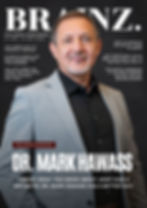How Do You Build Trust In A Cross-Cultural Team?
- Brainz Magazine
- Mar 21, 2023
- 4 min read
Written by: Liu Liu, Executive Contributor
Executive Contributors at Brainz Magazine are handpicked and invited to contribute because of their knowledge and valuable insight within their area of expertise.

As a manager, there are three scenarios in your work with a cross-cultural team. Scenario one, you manage a team in your home country and the group consists of people from different cultural backgrounds; scenario two, you are assigned to a different country to manage a team, and the team members are all from that foreign country; and scenario three, you manage a team in a foreign country and the team members are from different countries.

Sound familiar? The first thing first, how do you get to know your team and build trust? Let me start with one of my experiences. I was given the job of managing projects in Cambodia in my early years as a young manager. On my first trip, I needed to meet with the heads of the partner organizations to start with. There are two types of organizations we work with in Cambodia, ones headed up by the local people, and the ones headed up by US and European ex-pats. My first meeting with the ex-pats is like a mini-interview. We met at the office, and they went straight into the various technical questions to find out if and how I am qualified for this managerial role. While the first meetings with the Cambodian managers happened very differently. They came to my hotel, we drank some tea, had meals together, asked about each other a personal journey into the job we are doing, asked after each others’ families, and we agreed to meet again in the office to talk about work the following days.
This illustrates the ways people from different cultural backgrounds get to know each other and build trust. The US and European colleagues are from a cultural group called Cold Climate Culture. People from this culture tend to be task-oriented and individualistic, the trust is built based on how competent you are at your job. They don’t need to know your whole life story to work with you. Trust is built through logic or sometimes called cognitive trust.
For Cambodians, they are the Hot Climate Culture, relationships are the most important for any interaction with each other, and one’s identity is linked with various social groups they belong to. The trust is built through getting to know you as a person, your life stories, and your social connections. When they feel they know you deeply enough, then they will trust you and work with you. Their trust is a feeling-based affective trust.
Building trust in a cross-cultural team can be challenging, but it's essential for the success of the team. Here are some tips to help build trust in a cross-cultural team:
Cultural awareness: Develop an understanding of the cultural backgrounds of your team members. Learn about their customs, beliefs, and values. This can help you avoid misunderstandings and build trust by showing that you respect and value their culture.
Communication: Effective communication is essential in building trust. Ensure that communication is clear, concise, and respectful. Use language that is inclusive and avoids cultural assumptions or stereotypes.
Active listening: Listen actively to your team members to understand their perspectives, needs, and concerns. This shows that you value their input and are committed to working together.
Respect: Show respect for cultural differences and appreciate the unique strengths that each team member brings to the table. Avoid making assumptions or judgments based on cultural stereotypes.
Transparency: Be transparent about your goals, expectations, and decisions. This can help to build trust by demonstrating that you are open and honest.
Collaborate: Encourage collaboration and teamwork. Create opportunities for team members to work together and learn from each other. This can help to build trust by demonstrating that you value their contributions and are committed to working together towards shared goals.
Celebrate diversity: Celebrate the diversity of your team and its members. Recognize and appreciate the different backgrounds, experiences, and perspectives that each team member brings. This can help to build trust by creating a positive and inclusive work environment.
To find out more, read the article Hot vs Cold Climate Cultures by Timothy Harianja
Also, check out these related Brainz articles here
https://www.brainzmagazine.com/post/communicate-is-to-connect Written by: Haseena Shaheed-Jackson, Executive Contributor
https://www.brainzmagazine.com/post/executive-leadership-how-to-build-trust-and-why-it-s-so-important Written by: Kris de Jong, Executive Contributor

Liu Liu, Executive Contributor Brainz Magazine
Liu Liu is a coach and manager with decades of experience, as a Cross-Cultural Intelligence Coach who specializes in helping international organizations and businesses to improve communications and cooperation among staff for better individual and team performance. He coaches managers and leaders working in a cross-cultural context to build trust, communicate effectively, and deliver results. He also coaches people on management, leadership, and career development. He is someone who helps you to imagine a greater possibility for yourself and supports you in achieving it.
As a senior manager in an international relief and development organization, he has worked with people in over 30 countries over his two-decades-long career. He uses a coaching approach to manage cross-country teams and complex programs to deliver results and impacts.
He is also an experienced trainer and facilitator who has delivered training on management-related and other subjects in over 30 countries.
With a cross-country marriage, developing a career in a second country, and working in an organization that has a reach of 50 countries, Liu Liu understands the importance and pitfalls of working cross-culturally and developing a career in an unfamiliar environment.
Liu Liu is an Associated Certified Coach(ACC), a member of the International Coaching Federation (ICF), and an Executive Contributor to Brainz Magazine.
He holds a BA(Hon) in International Studies and an MSc in Development Management.



